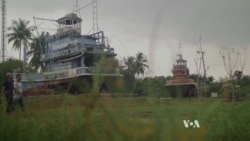When the massive Indian Ocean tsunami hit Thailand’s coast 10 years ago, the world saw images of huge waves hitting scenic beachside resorts. But in more rural areas, the disaster also killed scores of undocumented migrant workers from Myanmar.
It’s been a decade since the tsunami tore apart the Thai fishing village of Ban Nam Khem. But symbols of the fateful day remain.
Despite the government’s rush to aid in tourist areas, relief was slow for the hardest-hit villages, comprised largely of unregistered Burmese fishing laborers.
Fearing arrest and deportation, many survivors were forced to leave their jobs and property behind, unable to seek aid and find missing family members.
Community leader Wanchai Jitchareon said witnessing the mistreatment of the workers inspired him to help them reclaim their land and rebuild the community.
"The people were forced to move after the tsunami destroyed their houses and property, so people were busy trying to survive. That’s when Thai land developers took advantage to come and put up fences and signs saying 'No Entry' around disputed land," Wanchai Jitchareon said.
Registered laborers
Despite the deportation of more than 2,500 migrants in the months after the tsunami, there are now more migrant laborers in the province than before the disaster - and now most are registered.
Traditionally, the migrant workers take the undesirable jobs that Thais generally avoid. But in Ban Nam Khem, there were other reasons for the job openings.
"When the houses were rebuilt, the Thai people were afraid to live close to the water. They moved out, and they let us rent their houses. After the tsunami, we had more comfortable living quarters," said Hla Myo, a Burmese fisherman.
Despite DNA testing and extensive data collection on the dead, 495 bodies remain unclaimed at the local cemetery.
Prapat Kongmeung lost six members of his family, including his 7-year-old son, who remains missing.
The local fisherman said the government seemed to care more about the image of the tourist industry than identifying the remains of locals.
"I felt betrayed because they didn’t help us much. We are all human beings. Why did they treat us so different? They didn’t support us and took all the bodies to Phuket so the foreigners had convenient access," Prapat Kongmeung said.
As business and development resumes in the coastal area, many hope that the lessons learned from the past will not be forgotten in times of future hardships.





